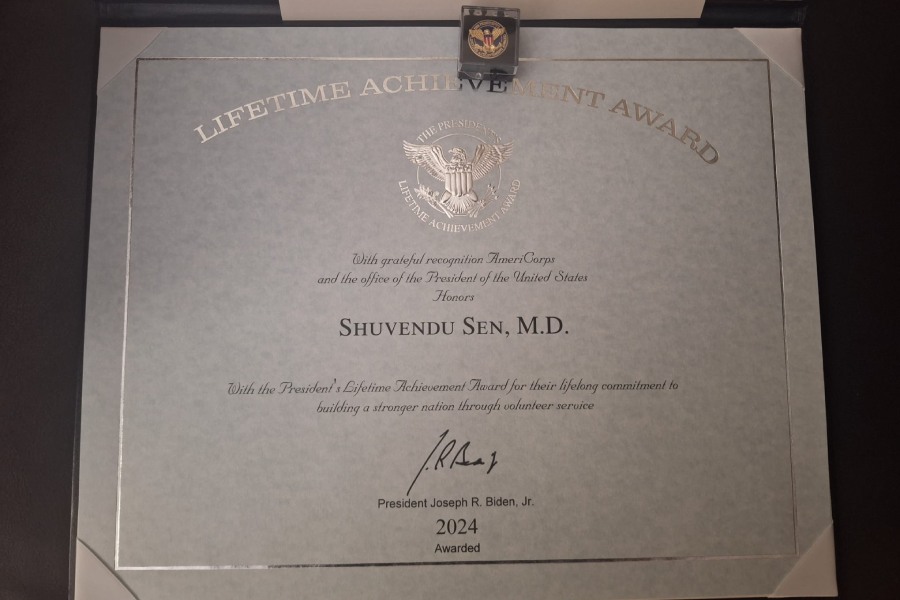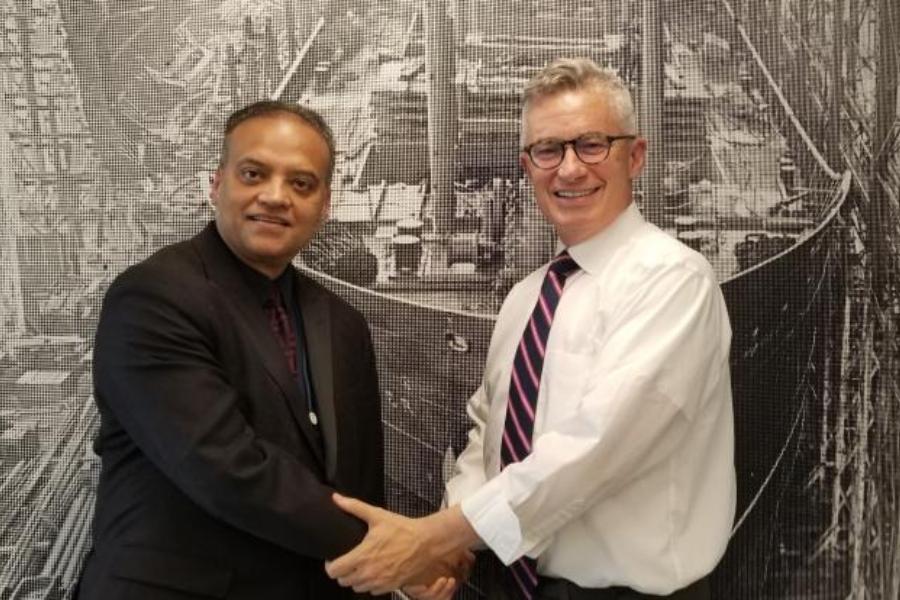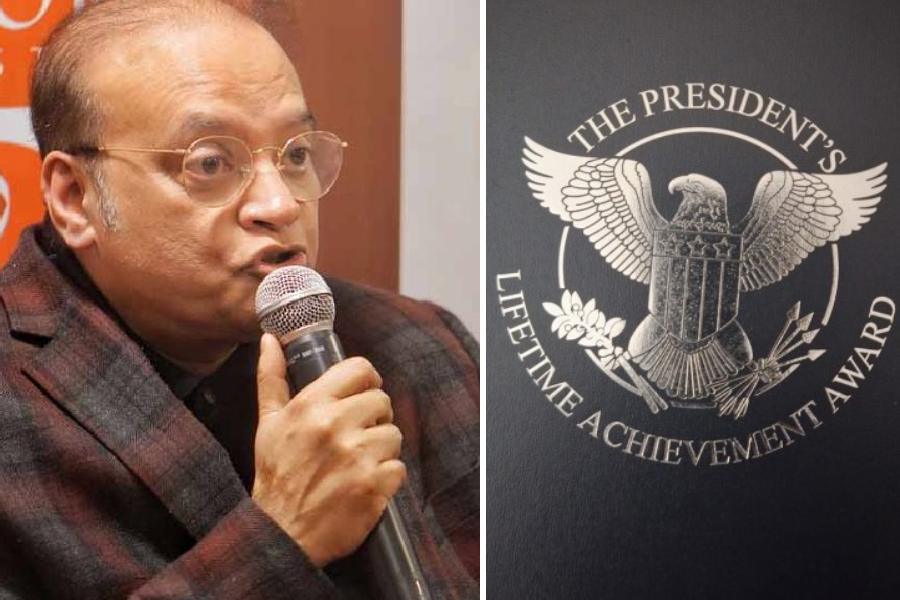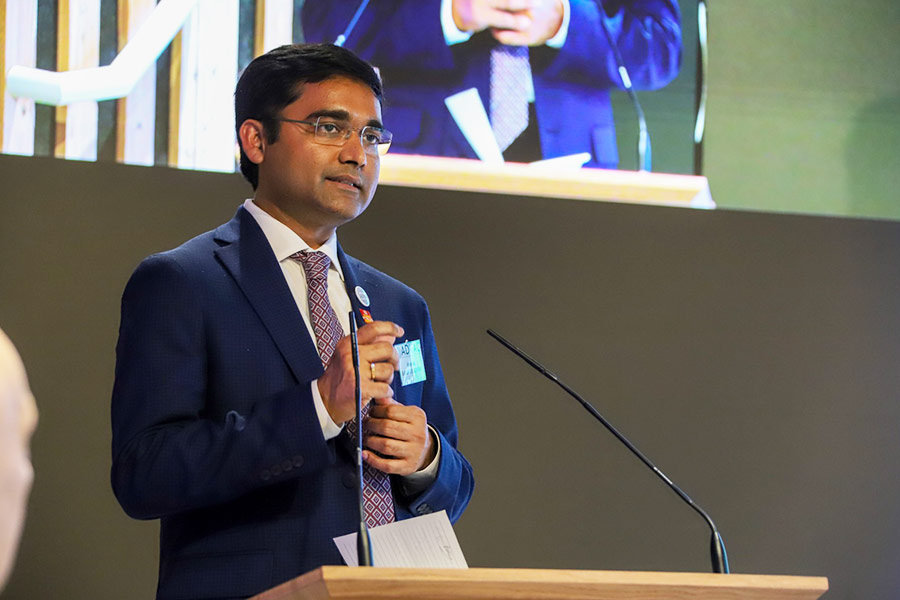“I always dreamed of taking medicine out of the hospital and into the streets,” says Shuvendu Sen, a US-based physician who has been honoured with the President’s Lifetime Achievement Award by AmeriCorps, a White House initiative recognising exceptional volunteer service. Founded in 1993 by Bill Clinton, AmeriCorps is an independent agency of the US government that strives to provide an “opportunity to individuals of all ages and backgrounds to give their time and talent to strengthen communities”. Sen, a My Kolkata columnist who is currently the vice-chair of research at the Jersey Shore Medical Center in New Jersey, has been recognised for his outstanding volunteering work and community service in the US, where he has been living for the past three decades.
‘We brought people off the streets and transformed them into skilled assistants’

Sen’s award is the culmination of three decades of work to empower community healthcare in the US Shuvendu Sen
Committed to bridging the gap between institutional healthcare and grassroots community care, Sen, a Kolkata boy, was moved by stories of his patients during his stints at the Bankura Medical College, the Calcutta National Medical College and SSKM. When he moved to the US for his higher education, he retained his knack to analyse the challenges faced by the most vulnerable and go beyond his professional commitments to assist them. As a young medical professional, Sen began volunteering in a pioneering certificate programme at Long Island University, designed to train underprivileged individuals as surgical assistants. “We brought people off the streets — some battling drug addiction, some single mothers with no formal education — and transformed them into skilled assistants,” shares Sen, whose service not only strengthened his belief in preventive care but inspired similar programmes nationwide.
Sen’s passion for community care found its most significant expression in North Carolina with the creation of Project Access. As the president of the Harnett County Medical and Dental Society, he rallied local doctors to adopt uninsured patients pro bono. “I asked them to see just one patient a week for free,” recalls Sen. The idea, supported by $750,000 in funding and the backing of then-Congressman Bob Etheridge, provided life-saving care to marginalised populations, including undocumented immigrants and African-American communities. The programme’s success earned national recognition, with then-President Barack Obama sending a congratulatory message, hailing Sen’s efforts as a model for community healthcare. “That moment reaffirmed my faith in how medicine can transcend institutional walls to serve society,” says Sen.
Decades of dedication and voluntary work, which often included long shifts on cold nights, culminated in Sen becoming one of the few Indian-origin individuals to receive the President’s Lifetime Achievement Award.“It’s not about the awards,” insists Sen. “These acknowledgments inspire others to step out of their comfort zone and make a difference.”
Understanding the paradoxes of US healthcare

Sen with James McGreevey, former governor of New Jersey
Drawing on his extensive experience of working in healthcare in the US, Sen feels that “the biggest drawback of the American system is its reliance on insurance”. “While the US boasts state-of-the-art facilities, marginalised people often lack access due to systemic inequities. In contrast, the UK’s NHS model offers universally accessible healthcare,” elaborates Sen. At the same time, Sen is quick to highlight the paradoxes baked into US healthcare by shedding light on America’s unparalleled public health awareness. “From TV ads to grassroots advocacy, the level of health education here is phenomenal,” says Sen. According to Sen, this is an area where India, despite its wealth of medical talent, requires considerable improvement: “In large parts of India, basic hygiene practices like handwashing are neglected. This needs urgent attention.”
With the winter peaking in India and the US and viruses gaining momentum, Sen takes a moment to reflect on Covid-19, emphasising the importance of global healthcare collaboration: “Pandemics don’t respect borders. We need standing organisations involving countries across Asia, Europe and the Americas to share data and pre-empt outbreaks.” Sen cites initiatives like the Coalition for Epidemic Preparedness Innovations (CEPI) and the Bill and Melinda Gates Foundation as examples of the collaborative frameworks necessary for the future. “The pandemic taught us that without unity, humanity is vulnerable,” stresses Sen.
‘Technology can democratise healthcare’

Digital healthcare can break barriers of geography and privilege, feels Sen TT Archives
Going forward, Sen envisions a shift from cure to prevention as the cornerstone of global healthcare. “Awareness is the pivot,” argues Sen. Through his writings, lectures and advocacy, Sen aims to promote preventative measures that address root causes rather than symptoms. “Simple interventions like dietary changes or handwashing can prevent diseases that lead to fatal outcomes,” explains Sen, who shares valuable everyday tips on healthcare in his bi-weekly columns for this publication. Sen also identifies immense potential in digitisation. “Technology can democratise healthcare,” says Sen, before adding: “Through digital platforms, we can disseminate critical health information globally, breaking barriers of geography and privilege.”
In addition to his medical endeavours, Sen is trained in the art of screenplay writing and has ventured into filmmaking, directing a documentary on the rehabilitation of former inmates through theatre. “I’ve always believed in spreading your wings,” smiles Sen. This philosophy extends to Sen’s ongoing efforts in India, where he regularly collaborates with organisations like Rotary Club and the Leprosy Mission to improve community health.
As Sen continues to straddle the worlds of institutional medicine and community care, his message is clear: “Healthcare must be inclusive, preventative and compassionate. The impact of empowering communities lasts a lifetime.”

